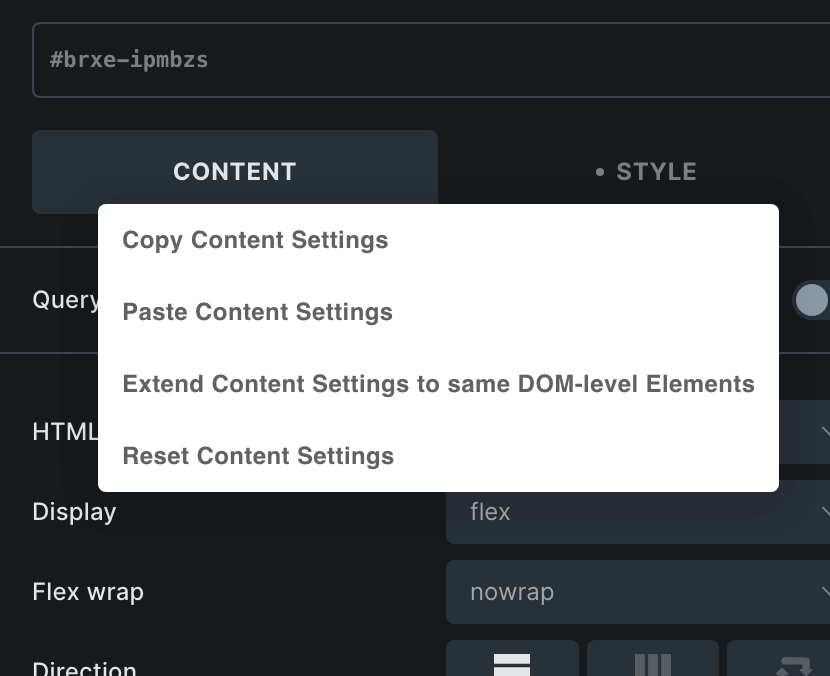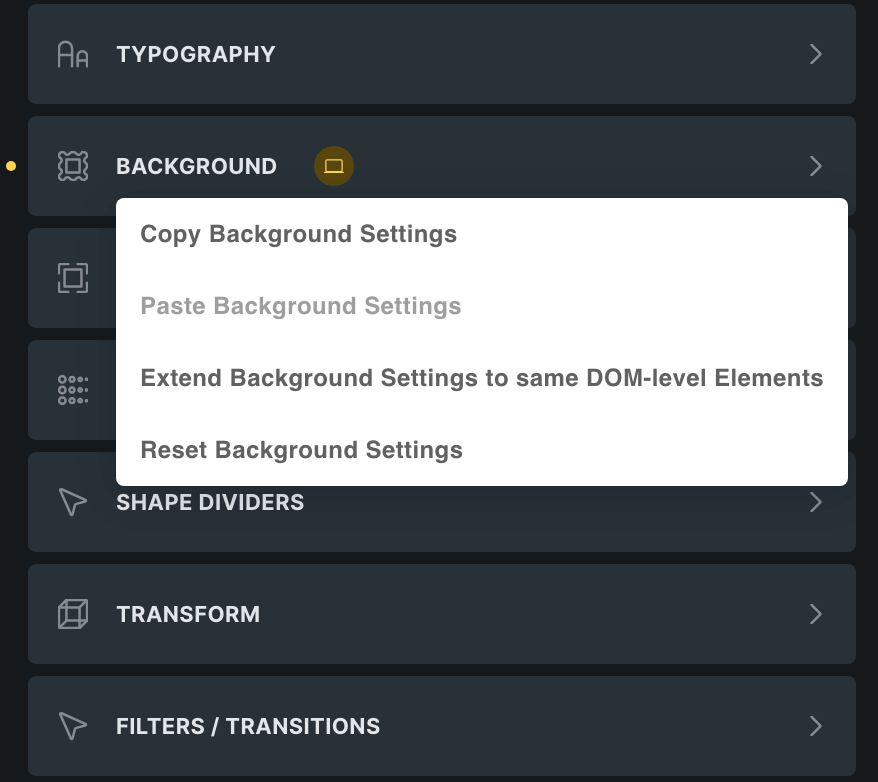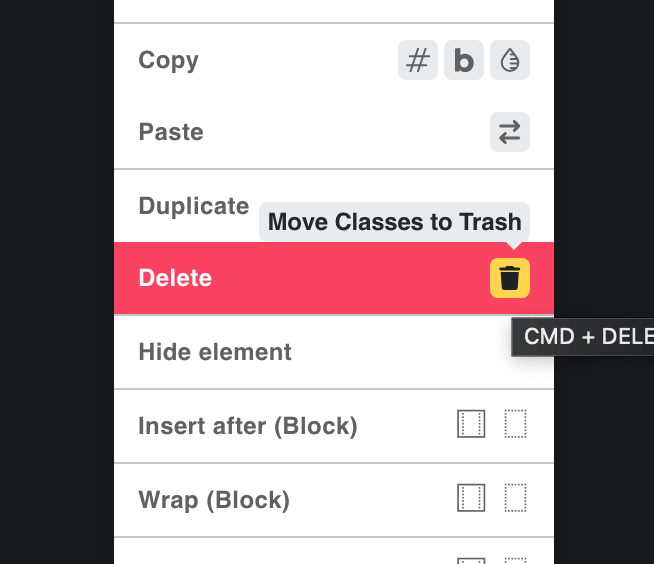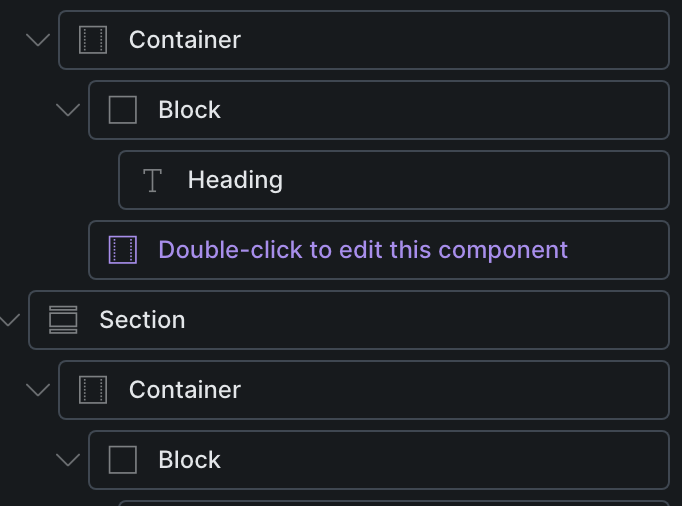Fixed an issue where clicking the Grid Builder icon next to the display dropdown would no longer open the AT Grid Builder overlay. This was caused by Bricks changing the DOM structure of the display control — the button class changed from visual-grid-builder-button to control-action-button inside a has-visual-grid-builder wrapper. The click handler has been updated to match the new structure, and propagation is now properly stopped to prevent the native Bricks grid builder from also opening.
Changelogs
Release 3.3.13
This version fixes issues related to the recent 2.2 Bricks update.
AT’s Grid Builder wasn’t opening when clicking on the Grid Builder icon
Release 3.3.12
This version includes multiple bug fixes related to the new Bricks 2.2.
Tags inserted from Dynamic Data now respect the current cursor position.
Previously, when inserting a dynamic data token (e.g. Tags inserted from Dynamic Data now respect the current cursor position.) via the Advanced Themer Dynamic Data Helper, the token was always appended at the end of the input field. Now, the token is inserted exactly where your cursor is placed, giving you more control over where dynamic values appear in your content.
Added new JS safeguards to the Class Manager in case the globalClasses array is corrupted with undefined values.
In some cases, third-party plugins (such as Doliconnect) could interfere with the Bricks builder state and corrupt the global classes data. This caused the Global Class Manager to crash or display incorrectly. Defensive checks have been added throughout the Class Manager to gracefully handle missing or malformed data, preventing runtime errors.
The color picker wasn’t firing on new Bricks 2.2 color controls
Bricks 2.2 updated its color control DOM structure, which broke the Advanced Themer color picker integration. The color input is now correctly detected with the updated markup.
The Visibility Floating Bar could be misdisplayed on large structures
On pages with large or deeply nested element structures, the Visibility Floating Bar could appear in the wrong position or overlap other UI elements. This has been corrected.
Removed license activation messages from ACF
Unnecessary ACF license activation notices were being displayed in the admin area. These messages have been removed.
Fixed a fatal error when using stagger effects on elements with styles registered as arrays
When applying stagger effects, a fatal PHP error (rtrim() expects a string, array given) could occur if an element’s styles were stored as an array instead of a string. This edge case is now handled correctly.
Fixed a JS error that could occur when some stylesheets return a 403 error from the server
When external or restricted stylesheets returned a 403 Forbidden response, attempting to read their CSS rules would throw a DOMException. The plugin now safely skips inaccessible stylesheets without interrupting the builder.
Removed “Undefined array keys” warnings on first plugin activation
On a fresh installation, before any theme settings had been saved, PHP warnings about undefined array keys were logged. Default values are now properly initialized even when no settings exist yet.
The contrast checker could trigger a JS error when unparseable colors were present in the DOM
The contrast checker library could crash when encountering color values it couldn’t parse (e.g. CSS variables or non-standard formats). These errors are now caught and handled gracefully.
Persistent Link Spacing Controls (available in Bricks 2.2)
The Persistent Link Spacing Controls feature has been removed, as Bricks 2.2 now includes this functionality natively. All related code has been cleaned up from the plugin.
Release 3.3.10
This release resolves a compatibility issue with WordPress 6.9 and includes several general improvements to AT’s builder functions.
AT styles not loaded inside the builder with WordPress 6.9
A conflict with the newly released WordPress 6.9 caused all AT styles to be loaded inside the iframe instead of the builder window, breaking the overall builder experience.
AT version is now programmatically loaded in the Theme Settings
Previously, the version tag displayed in the Theme Settings had to be updated manually for each release, which could lead to mismatches between the actual version and the shown tag. It is now generated automatically by the plugin’s build scripts.
SCSS code wasn’t visible in Advanced CSS when breakpoints were set on Mobile-First
In Mobile-First environments, some SCSS code inside the Advanced CSS modal could fail to be included inside the Editor.
CSS conflict with the plugin Frontend Admin
A CSS conflict with the Frontend Admin plugin could lead to hide the Theme Settings of Advanced Themer.
Orphaned elements could break the Structure Helper modal
If Bricks left behind any orphaned elements, the Structure Helper could trigger a JavaScript error that prevented the modal from opening properly.
ACF updated to v6.6.2
Following recent security enhancements by the ACF team, the ACF Pro version bundled with AT has been updated to 6.6.2.
Release 3.3.11
This release fixes an issue where certain server configurations failed to parse the builder.css file as CSS, causing errors in the builder.
Builder.css not correctly parsed as CSS file.
Incorrect version of builder.css could cause the server to misidentify the file and fail to parse it as CSS.
Release 3.3.8
This version includes various fixes related to the recent 2.1 Bricks update.
Imported classes could be detached from the element on a recent update
Imported classes from the Class Importer in the Theme Settings could sometimes be removed from the elements they were applied to in the builder.
Wrong background-color on element shortcut icons when pseudo-element shortcuts are deactivated
Minor UX issues in the builder related to specific css applied when pseudo-element shortcut were not active.
Force Theme to dark could fail
Forcing the color Theme to dark in the Theme Settings > Global colors could potentially fail and still show the light theme.
Mobile-first page.css could be missing in Advanced CSS
When setting the base breakpoint to Mobile First in Bricks, CSS declarations saved inside the page.css stylesheet of Advanced CSS were applied correctly in both the builder and the frontend, but disappeared from view after refreshing the builder.
Keyboard shortcuts for Grid Guides, Xmode, Contrast Checker and Darkmode stopped working correctly
The keyboard shortcuts for the builder tweaks Grid Guides, Xmode, Contrast Checker and Darkmode weren’t triggering the corresponding functions since version 3.3.
ColorPicker within the Color Manager could wrongly resolve valid hex colors
Fixed an issue where the Color Picker library used by the Color Manager was rounding hex values too aggressively when converting to RGB, resulting in possible slightly incorrect color outputs.
PHP Warnings when the Theme Settings haven’t been saved yet
Fixed a PHP warning that could appear on first installation before Theme Settings were saved.
Quick Remote Templates wasn’t working anymore since Bricks 2.1
A recent change in Bricks 2.1 lead to breaking the AJAX call to the remote templates, thus the Quick Remote Template feature stopped working correctly.
Class Manager: Renaming an active global class could fail being persistant on class change
In the Class Manager of AT, renaming a global class while the class was active in the builder could possibly revert to the old name as soon as another class was being activated.
The variable picker was triggered when clicking on the Bricks CSS icon event when the event was set to right-click
When the event of the AT variable picker was set to “right-click”, clicking on the native Bricks CSS icon to open the native variable dropdown would also trigger the variable picker from AT.
Release 3.3.9
Hotfix.
Missing headers and footers templates on the frontend
In the some cases, enabling 3.3.8 would hide header/footer templates on the frontend.
Release 3.3.7
This release is a hotfix addressing an issue with the Plain Classes model introduced in version 3.3.6.
Plain Classes: classes were updated only when “bulk edit” was active
In the Plain Classes modal, editing, removing, or adding a class did not update the editor correctly unless the ‘Edit Bulk’ mode was enabled.
Release 3.3.6
This release primarily fixes bugs introduced in Bricks 2.0, especially those affecting the Strict Editor View, and also addresses improvements to the overall Builder experience.
NEW: Strict Editor View: Hide Quick Access Bar in the Element Panel
A new option in the Strict Editor’s builder tweaks has been added to hide the Quick Access Bar for all editors on the site.

NEW: Strict Editor View: Hide Search Box in the Element Panel
A new option in the Strict Editor’s builder tweaks has been added to hide the Search Box in the Element panel.

NEW: Strict Editor View: Hide Elements States in the Structure Panel
A new option in the Strict Editor’s builder tweaks has been added to hide the Elements States within the Structure Panel for all editors on the site.

NEW: Strict Editor View: Hide Header in Element Panel
A new option in the Strict Editor’s builder tweaks has been added to hide the Element Panel’s header for all editors on the site.

NEW: Strict Editor View: Hide Element Action in the Preview window
A new option in the Strict Editor’s builder tweaks has been added to hide the Element Actions in the Preview window for all editors on the site.

NEW: Strict Editor View: Disable Contextual Menus
A new option in the Strict Editor’s builder tweaks has been added to hide the Contextual Menus for all editors on the site.

Plain Classes now supports bulk edit
When you add global classes to an element through the Plain Classes modal with Bricks’ “Bulk Edit” feature enabled, those classes will be correctly applied to all selected elements.
gpt5/gpt-mini/gpt-nano added to the AI models
All GPT-5 models are now available in the list of selectable models under Theme Settings > AI Options.
Removed StickyCSS, Visibility Bar and Responsive Slider/Helper as active by default
The following tweaks were previously enabled by default on new installations:
- StickCSS (Structure Menu)
- Visibility Bar (Structure Menu)
- Responsive Slider (AT Main Menu)
- Responsive Helper (AT Main Menu)
However, they often caused more confusion than benefits, as many users struggled to find where to disable them. For this reason, they are now turned off by default.
Advanced CSS: page.css code is now written in the base breakpoint only
Previously, when adding Custom CSS to page.css in the Advanced CSS modal with a specific breakpoint active, the code could be applied to that breakpoint’s settings instead of the base. Now, all CSS added to page.css is always applied to the base breakpoint, regardless of which builder breakpoint is active.
Content/Style Tabs & Control group Contextual Menu: smarter handling of element settings when a global class is active
In the initial version of the new ‘Content/Style Tabs Context Menu’ tweak, the script sometimes failed to correctly distinguish between settings belonging to a Class and those belonging to an ID when a global class was active. This caused unexpected results when copying and pasting settings between elements.
Convert values to Logical Properties: new option in the converter to revert back the changes to directional properties
Previously, if users converted directional properties into logical properties, there was no way to undo the change. A new button has now been added in the Converter tab, allowing you to revert all logical properties on your site back to directional properties.
Focus on First Unlocked Class: could miss the focus
In some cases — especially when clicking inside the preview window — the global class wasn’t correctly applied to the Element panel, which could cause unexpected issues.
Locked Class Indicator stopped working correctly
Since the Bricks 2.0 update, the color indicators (green/red) for locked and unlocked global classes in the Element Panel were no longer working.
The class lock icon wasn’t clickable when Plain Classes was set as the default class picker
When the Plain Classes modal was set as the default class picker in Theme Settings, the native Bricks class lock icon in the Element Panel became unclickable since Bricks 2.0.
SuperPowerCSS: could fail to save the custom css
Due to changes in how Bricks 2.0 saves custom CSS values to the database, code added in SuperPowerCSS could sometimes fail to save correctly on page reload.
Generate Global Query wasn’t showing up in the Query Popup anymore
Since Bricks 2.0, the option to generate a global query from the Native Query popup was missing.
Global Query List icon wasn’t showing next to the Query Loop icon anymore
Since Bricks 2.0, the Global Query List icon — used to assign a global query to an element — was missing.
When opening the Class Manager, the custom css of the previously selected class could result blank
Occasionally, reopening the Class Manager in CSS View would display a blank CSS editor until a key was pressed and remount the content of the Global Class.
Adding custom css to a class through the Class Manager could fail to correctly render
Due to changes in Bricks 2.0, editing the custom CSS of a global class via the AT Class Manager could cause incorrect rendering in the builder and prevent the changes from being saved correctly to the database.
display:none applied on the darkmode elements removed the element from the accessibility tree
Previously, we added an inline display: none style to Dark Mode buttons and toggles to prevent FOUC on page load. However, this also removed them from the accessibility tree, making the elements unfocusable via keyboard.
Structure Generator: drag & drop images fail
In the Structure Generator Modal, dropping an image into the dropzone input did not correctly send the image data to the prompt, preventing the ‘image to code’ feature from executing.
DEPRECATED: Strict Editor View: removed toolbar icons related to the Role Capabilities (since Bricks 2.0)
All toolbar icons for features now managed directly through the new builder capabilities in Bricks 2.0 have been removed. The remaining icons are those loaded by Bricks by default, regardless of the user’s role capabilities.
DEPRECATED: Strict Editor View: Disable clickable elements in the iframe (Since Bricks 2.0)
The option to disable specific elements for Editor roles is now handled by Bricks 2.0’s built-in improvements and has therefore been deprecated.
DEPRECATED: Strict Editor View: Reduce Left Panel Visibility
The editor builder tweak ‘Reduce Left Panel Visibility’ is now incompatible with Bricks 2.0’s new role capabilities system and has therefore been deprecated.
DEPRECATED: Code Element Tweaks (Since Bricks 2.0)
Since Bricks 2.0 now allows opening code editors in full screen natively, the Code Element tweaks have been deprecated.
Release 3.3.5
This release fixes and improves existing features.
Some content inside Control Groups were unclickable
A CSS declaration caused certain elements inside the Control Group title—such as style indicators—to become unclickable.
ACF was stripping HTML code inside the Theme Settings
The latest ACF Pro release was escaping HTML in some group labels within the Theme Settings.
SCSS compiled on frontend even when the option was turned off
In some cases, SCSS code added in SuperPowerCSS was overriding native Custom CSS—even when the SCSS option was disabled in the Theme Settings.
Pasting/resetting from new contextual menu’s is supporting bulk edit
Pasting or resetting styles via the contextual menus in both the Content/Style tabs and Control Groups now fully supports Bricks’ native Bulk Edit feature.
Structure header icons restyled
The Structure header icons have been restyled to match the same styles as the Element Panel icons.
Release 3.3.4
This release includes a handful of new minor builder tweaks and improvements/fixes related to functions introduced recently.
Content/Style Tabs Contextual Menu
Control Group Contextual Menu
Ever wanted to copy the values of a specific Control Group and apply them to another breakpoint, element, or even a global class? With the new Control Group Contextual Menu, you can do it in just a few clicks. Copy, paste, reset, or even extend values to all elements at the same DOM level—instantly and effortlessly.
Remove Classes on Delete
Removing elements from the Structure is straightforward—but what about the global classes attached to them? They often get left behind as orphans, cluttering your global class list. With this new option in the contextual menu, you can now remove both the elements and their attached classes in one go.
Class Preview on Hover now supports multiple elements selected
Hovering over a global class in the Bricks class dropdown now previews the class on the current element—and on all selected elements when bulk edit is enabled.
Focus Mode: Jump to parent element
A new option has been added to the Focus Mode message, allowing you to jump to the parent element without exiting the Focus Mode.
Focus Mode: Apply Focus in the iframe
A new option has been added to the Focus Mode message, allowing you to automatically highlight the corresponding iframe section when focusing an element in the Structure Panel—keeping both views perfectly in sync.
Focus Mode: Trigger focus mode by clicking an element inside the iframe
You can now trigger Focus Mode by holding CMD/CTRL + SHIFT and clicking any element inside the iframe—not just from the Structure Panel.
SuperPowerCSS: layout shift improved when switching elements
When jumping tabs or elements, SuperPowerCSS could produce a significant layout shift. Now the experience should be a lot smoother.
Class Contextual Menu: new option to convert all children of a container to logical properties
A new option has been added to the Class Contextual Menu, allowing you to convert directional properties to logical properties—for the current element, its attached global classes, and all of its child elements.
empty UX Builder Settings could generate a JS error that break AT functions
A JavaScript error could occur when the UX Builder settings were empty, causing other functions to break.
Class Preview on hover wasn’t working anymore
Hovering over global classes within the class dropdown of Bricks didn’t trigger the preview inside the Iframe anymore.
SuperPowerCSS: controls group layout broken when Control Group Visibility was set to “always” in the Bricks Settings
Bricks 2.0 introduced new options for handling control group visibility. When the control group visibility was set to “always”, the layout of SuperPowerCSS could be broken when containing long CSS declarations.
Color Manager: Switch to darkmode wasn’t applying anymore
Clicking on the dark mode switcher within the Color Manager no longer triggered the color scheme switch.
Editing a class could conflict with right shortcut keyboard shortcuts
Renaming an ID or a class in the builder could trigger the keyboard shortcuts of the right shortcut panel and wrongly create elements in the Structure Panel.
SECURITY: ACF Pro updated to v6.4.3
This is a security update from the ACF team.
DEPRECATED: Strict Editor View: Remove Template & Settings links everywhere (Bricks 2.0)
You can now set these settings in the native Bricks capabilities.
DEPRECATED: Strict Editor View: Disable Header & Footer edit button on hover (Bricks 2.0)
You can now set these settings in the native Bricks capabilities.



